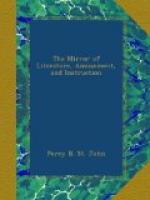If no state reason interfered, the conqueror made what profit he could of his prisoners. Froissart, in speaking of Poictiers, adds, that the English became very rich, in consequence of that battle, as well by ransoms as by plunder, and M. St. Palaye, in his “Mem. sur la Chevalrie,” mentions that the ransom of prisoners was the principal means by which the knights of olden time supported the magnificence for which they were so remarkable. In the next century, the articles of war drawn up by Henry V. previous to his invasion of France, contain the condition, “that be it at the battle or other deeds of arms, where the prisoners are taken, he that may first have his Faye shall have him for a prisoner, and need not abide by him;” by Faye, probably the promise given by the vanquished to his captor to remain his prisoner, is understood; as the expression donner sa foi, occurs in various French historians. The value of a ransom is sometimes estimated at one year’s income of a man’s estate, and this opinion is supported by the custom of allowing a year’s liberty to captives to procure the sum agreed upon. By the feudal law, every tenant or vassal was bound to assist his lord in captivity, by a contribution proportionate to the land he held. As, however, the amount received for prisoners is very various, personal importance had no doubt great weight in the determination of a captive’s value. Bertrand du Guescelin who had no property, valued his own ransom at 100,000 livres; and Froissart, at the same period mentions the ransom of a King of Majorca, of the house of Arragon, as being exactly that sum.
(To be continued.)
* * * * *
THE FATHERLAND.[1]
(FROM THE GERMAN OF ARNDT.)
(For the Mirror.)
What is the German’s Fatherland?
On Prussia’s coast, on Suabia’s
strand?
Where blooms the vine on Rhenish shores?
Where through the Belt the Baltic pours?
Oh
no, oh no!
His
Fatherland’s not bounded so.
What is the German’s Fatherland?
Bavaria’s or Westphalia’s
strand?
Where o’er his sand the Oder glides?
Where Danube rolls his foaming tides?
Oh
no, oh no!
His
Fatherland’s not bounded so.
What is the German’s Fatherland?
Tell me at length that mighty land.
The Swilzer’s hills, or Tyrolese?
Well do that land and people please,
Oh
no, oh no!
His
Fatherland’s not bounded so.
What is the German’s Fatherland?
Tell me at length the mighty land.
In noble Austria’s realm it lies,
With honours rich and victories?
Oh
no, oh no!
His
Fatherland’s not bounded so.
What is the German’s Fatherland?
Tell me at length that mighty land,
Is it what Gallic fraud of yore,
From Kasier[2] and the empire tore?
Oh
no, oh no!
His
Fatherland’s not bounded so.




